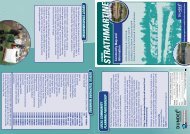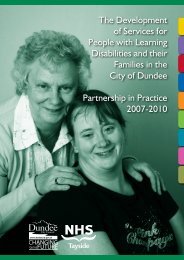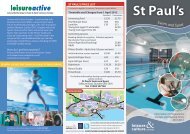Information for Parents and Carers of Children with - Dundee City ...
Information for Parents and Carers of Children with - Dundee City ...
Information for Parents and Carers of Children with - Dundee City ...
Create successful ePaper yourself
Turn your PDF publications into a flip-book with our unique Google optimized e-Paper software.
A CHILD I KNOW HAS ADDITIONAL NEEDS<br />
HOW CAN I HELP?<br />
A Guide <strong>for</strong> relatives <strong>and</strong> friends<br />
When a child is diagnosed as having additional needs, the parents may face new emotional<br />
<strong>and</strong> physical dem<strong>and</strong>s. In the beginning they have to learn to cope <strong>with</strong> the additional needs<br />
<strong>of</strong> their child. <strong>Parents</strong> also have needs themselves which require underst<strong>and</strong>ing <strong>and</strong> support<br />
from family <strong>and</strong> friends.<br />
HOW CAN RELATIVES AND FRIENDS HELP?<br />
Talking With The Family<br />
Keeping an open relationship <strong>with</strong> friends <strong>and</strong> relatives is one <strong>of</strong> the most effective ways to<br />
reduce the pressure on parents <strong>of</strong> a child <strong>with</strong> additional needs. The following suggestions<br />
may help you to develop the type <strong>of</strong> communication that the family will appreciate.<br />
Listen actively when you talk <strong>with</strong> the child’s parents (more than “hearing” what the<br />
parents have said “think about what they tell you <strong>and</strong> what they may be trying to tell<br />
you”)<br />
Keep communication lines open. Be available to talk, to listen <strong>and</strong> to encourage the<br />
child’s parents. For example, arrange a time <strong>for</strong> a c<strong>of</strong>fee <strong>and</strong> a chat.<br />
Be open <strong>and</strong> honest about your own feelings about the child when speaking to the<br />
child’s parents, but do not <strong>of</strong>fend them.<br />
Ask questions. If you do not know what parents need from you, simply ask them.<br />
<strong>Parents</strong> May:<br />
Have feelings <strong>of</strong> being “trapped” because <strong>of</strong> the physical ef<strong>for</strong>ts <strong>and</strong> extra organisation<br />
needed to go out (from simple family picnics to longer, planned holidays). Travelling <strong>for</strong><br />
all outings may require regular lifting <strong>of</strong> the child <strong>and</strong> <strong>of</strong> many pieces <strong>of</strong> equipment<br />
(walking frame, pusher, wheelchair). There may be concerns about enough room in the<br />
car, finding places <strong>with</strong> appropriate facilities, wheelchair access, toilets, difficulties<br />
involved in lifting <strong>and</strong> positioning the child, accommodation, problems <strong>with</strong> eating out<br />
<strong>and</strong> specially prepared foods. All <strong>of</strong> these factors make it difficult to plan long term <strong>and</strong><br />
makes the family less able to make a simple decision to go out.<br />
Feel they have to put their own needs aside in order to cater <strong>for</strong> the extra needs <strong>of</strong> the<br />
child <strong>and</strong> this can be stressful <strong>for</strong> the parents.<br />
<strong>In<strong>for</strong>mation</strong> Pack – <strong>Children</strong>’s Services 7













